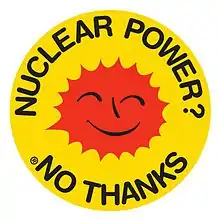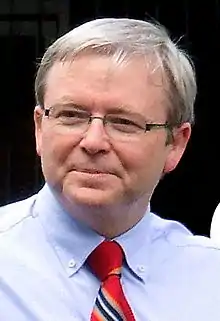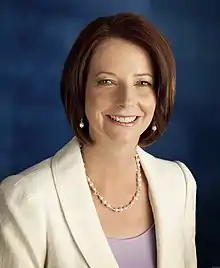Peter Garrett
Peter Robert Garrett AM (born 16 April 1953)[2] is an Australian musician, environmentalist, activist and former politician.
Peter Garrett | |
|---|---|
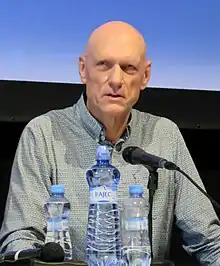 Garrett at Colours of Ostrava, 2017 | |
| Minister for School Education, Early Childhood and Youth | |
| In office 14 September 2010 – 26 June 2013 | |
| Prime Minister | Julia Gillard |
| Preceded by | Simon Crean |
| Succeeded by | Bill Shorten |
| Minister for the Environment, Heritage and the Arts | |
| In office 3 December 2007 – 14 September 2010 | |
| Prime Minister | Kevin Rudd Julia Gillard |
| Preceded by | Malcolm Turnbull |
| Succeeded by | Tony Burke |
| Member of the Australian Parliament for Kingsford Smith | |
| In office 9 October 2004 – 7 September 2013 | |
| Preceded by | Laurie Brereton |
| Succeeded by | Matt Thistlethwaite |
| Personal details | |
| Born | Peter Robert Garrett 16 April 1953 Sydney, New South Wales, Australia |
| Nationality | Australian |
| Political party | Labor |
| Spouse(s) | Doris Ricono-Garrett (m.1986) |
| Children | 3 |
| Residence | Randwick, New South Wales, Australia[1] |
| Alma mater | Australian National University (BA) University of New South Wales (LLB) |
| Profession | Musician, politician |
| Awards | Member of the Order of Australia (2003) Officer of the Ordre des Arts et des Lettres (France, 2009) |
| Height | 1.93 metres (6 ft 4 in) |
| Website | petergarrett |
In 1973, Garrett became the lead singer of the Australian rock band Midnight Oil. As a performer he is known for his signature bald head, his eccentric dance style, and a "mesmerising onstage presence".[3][4][5][6] He served as President of the Australian Conservation Foundation for ten years before being elected for the Labor Party as the Member of the House of Representatives for the seat of Kingsford Smith in the 2004 election.
After Labor's victory in the 2007 election, Garrett was appointed Minister for the Environment, Heritage and the Arts by Prime Minister Kevin Rudd.[7] Following the 2010 election, he was made Minister for School Education, Early Childhood and Youth by Prime Minister Julia Gillard.[8] In the aftermath of the 2013 leadership spill, Garrett resigned from the Ministry and announced he would retire from politics at the 2013 election.[9][10]
In 2003, Garrett was appointed a Member of the Order of Australia, "for service to the community as a prominent advocate for environmental conservation and protection, and to the music industry."[11] In 2009, the French Government appointed Garrett an Officer of the Order of Arts and Letters.[12] In 2010, the World Wide Fund for Nature presented him with their Leaders for a Living Planet Award.[13]
Early life
Born on 16 April 1953, in Wahroonga, Sydney,[2] Garrett attended Gordon West Public School and then Barker College in Hornsby before studying politics at the Australian National University (ANU), where he was a resident at Burgmann College, and later law at the University of New South Wales. His father died while he was still at school. His mother died in a fire at the family home, during his period at university.[14][15][16][17]
Musical career and activism
In 1973, Garrett became the lead singer for the rock band Midnight Oil, after responding to an advertisement placed by one of the band's founding members, Rob Hirst. In tandem with their musical and commercial success, the band were strongly identified with environmental and Aboriginal rights causes. They were particularly critical of the military and foreign policy of the United States during the 1980s. On and off stage, Midnight Oil often made political statements. At the closing ceremony of the 2000 Olympic Games in Sydney, the group performed before then-Prime Minister, John Howard, and a television audience of hundreds of millions, wearing black overalls bearing the word "sorry". This referred to the Howard Government's refusal to apologise to Aboriginal Australians for the former policy of removing Aboriginal children from their families.[18][19]
During his time with Midnight Oil, Garrett served two terms as President of the Australian Conservation Foundation (from 1989 to 1993 and 1998 to 2004. He was also invited to join the international board of Greenpeace in 1993 for a two-year term. He served as an adviser and patron to various cultural and community organisations, including Jubilee Debt Relief, and was a founding member of the Surfrider Foundation.[1][20] In 2000, Garrett was awarded the Australian Humanitarian Foundation Award in the environment category and in 2001 he received an honorary Doctorate of Letters from the University of New South Wales. Garrett announced his departure from Midnight Oil in 2002, saying he wished to concentrate more fully on his environmental and social activism.[21][22]
Although no longer part of the band, Garrett performed several times with Midnight Oil in the following years. After the Asian tsunami on 26 December 2004, Garrett joined the other members of Midnight Oil to perform as part of the fund-raising event WaveAid. On 7 July 2007, Garrett presented Crowded House at the Australian leg of Live Earth. On 14 March 2009, Garrett performed live at the Melbourne Cricket Ground with Midnight Oil for Sound Relief, in order to raise money for the Victorian bushfire appeal.[23] In November 2012, Garrett and Paul Kelly inducted Yothu Yindi in the ARIA Hall of Fame and performed with the band their best-known song "Treaty".[24]
On 5 May 2016, after the conclusion of his career in Parliament, Garrett announced that Midnight Oil would be reforming and that they would be touring in 2017, including a trip to the United States.[25][26] Midnight Oil stated on their Facebook page: "We wanted you to be the first to know that the five of us are planning to do some gigs in Australia and overseas during 2017."[27] Days later, Garrett also announced his first solo album, A Version of Now, which was released on 15 July.[28][29][30]
Political career
Garrett's first attempt to enter the Australian Parliament came in December 1984, when the Nuclear Disarmament Party (NDP) invited him to stand for a New South Wales seat in the Australian Senate at the federal election. He refused at first, but after consulting his bandmates, he agreed on the condition that he head the ticket. He needed 12.5% of the statewide vote to win a seat in the Senate voting system, but a primary vote of 9.6% proved insufficient when Labor allocated its second preferences to the Democrats ahead of the NDP.[31]
After the conclusion of Garrett's term as President of the Australian Conservation Foundation ended, in June 2004 Labor Leader Mark Latham announced that Garrett would become an Australian Labor Party candidate for the House of Representatives at that year's federal election, in the safe New South Wales seat of Kingsford Smith which was being vacated by the former Cabinet Minister Laurie Brereton. There was some initial criticism from Labor members within the electorate, as the local branch had wished to select their own candidate; in the end, Garrett was comfortably elected for the seat in October 2004.[32] Six months after entering Parliament, Garrett was appointed Shadow Parliamentary Secretary for Reconciliation and the Arts.[33]
Upon his entry to Parliament, it was reported that Garrett had modified some of his earlier views.[34] He expressed support for the U.S.-Australia alliance, and recanted earlier opposition to the Joint U.S.-Australian Defence Facility at Pine Gap.[35] He also stated that, while he would argue the case for environmentalism inside the Labor Party, he would observe the ultimate decision of the party caucus, including accepting any decision on the "no new uranium mines" policy.[36] Garrett's change of stance drew criticism from both journalists and Midnight Oil fans, who contrasted Garrett's former pronouncements on environmental and political issues he had made before joining the Labor Party.[37]
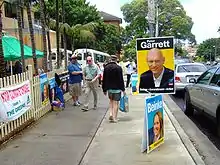
While some in the media labelled him a "turncoat", some, such as Eureka Street and the Canberra Times columnist and ANU academic John Warhurst, defended his need to be a "team player" if he was going to succeed in the political game "from the inside".[34]
Garrett campaigned for Labor in the 2006 Victorian state election, causing some controversy when he sent a letter to voters in the seat of Melbourne, where Labor and the Greens were embroiled in a tight contest. In the letter Garrett urged voters not to vote for the Greens, claiming they were in alliance with the conservative Liberal Party. This incurred the ire of Greens Leader, and former Garrett ally, Bob Brown, who accused Garrett of having "sold out" and of going against the environmental movement since joining the Labor Party.[38]
In December 2006, Kevin Rudd appointed Garrett to his Shadow Cabinet as Shadow Minister for Climate Change, the Environment, Heritage and the Arts.[39] Garrett supported Rudd in that month's leadership spill, a decision he would later come to regret, saying years later that it was "certainly the biggest mistake" he made in his political career.[40]
During the 2007 election campaign, Garrett caused some controversy after the journalist Steve Price claimed that Garrett had said to him Labor would change their policies if put in power. This was disputed by Garrett as a "short jocular conversation".[41] Garrett was comfortably re-elected for Kingsford Smith in the election, with a 4.56% swing towards him.[42]
Environment Minister
After Labor's victory in the 2007 election, Prime Minister Kevin Rudd appointed Garrett as Minister for the Environment, Heritage and the Arts in the Cabinet, although responsibility for climate change was separated from the portfolio and handed to Senator Penny Wong.[43][41] Although Garrett requested to represent the Government on climate change within the House of Representatives, Rudd instead gave that responsibility to Treasurer Wayne Swan.[44]
In his first acts in the role, Garrett approved a controversial plan to dredge Melbourne's Port Phillip Bay.[45] This move attracted strong criticism from some environmental groups, who were concerned that the 23 million cubic metres of sand, rock and contaminated silt dredged from the bay's shipping channels would affect fishing and tourism in the area.[46][47] Garrett also refused federal funding that would have enabled a remount of Elke Neidhardt's acclaimed Adelaide production of Der Ring des Nibelungen in 2008.[48][49][50]
As Environment Minister, Garrett was responsible for implementing the Government's whaling conservation policy, which included the cessation of commercial and "scientific" whaling.[51] Japan's annual trips to the Southern Ocean to kill whales in the name of science was most controversial issue, with the Australian Government attempting to negotiate a cessation of "scientific" whaling at the annual meetings of the International Whaling Commission. These negotiations were unsuccessful, culminating in Australia taking Japan to the International Court of Justice (ICJ). Although the case was concluded after Garrett had left politics, the ICJ eventually announced its judgement, based on his application, that Japan must stop whaling in the Southern Ocean.[52]
In August 2008, Garrett approved a major expansion of South Australia's Beverley uranium mine, saying the mine would demonstrate global best practice for environmental protection.[53] Garrett's decision was praised by the uranium industry, but criticised by the Australian Conservation Foundation, the organisation Garrett previously led, which said the decision would result in the mine spreading acid and radioactive pollution over 100 square kilometres (39 sq mi).[54] Later that year, Garrett announced the withdrawing of all A$2.6 million funding from the Australian National Academy of Music (ANAM).[55]
In 2009, Garrett chose not to give the proposed A$2 billion Tamar Valley mill approval until more studies were undertaken on its potential impact on marine environments. A new condition was put on the mill, meaning Gunns could be liable for criminal and civil penalties if the mill was approved and broke defined "environmental limits".[56] That same year saw Garrett also rejected proposals to impound the Mary River through the construction of the Traveston Crossing Dam. Garrett determined that the impacts of the proposed dam on the threatened species of Australian lungfish, the Mary River Turtle and the Mary River cod would be too great and of national environmental significance.[57]
In a 2010 reshuffle of his Cabinet, Rudd demoted Garrett to the outer ministry in response to Garrett's administration of the Home Insulation Program (HIP), which was linked to four deaths, over 100 house fires and allegations of fraud.[58][59][60] It was subsequently revealed in May 2010 that Garrett had written to Rudd on four occasions raising concerns about safety.[61] Following the leadership spill in June 2010, which saw Rudd replaced by Julia Gillard, Garrett's colleague Gary Gray revealed most MPs believed Garrett was demoted because "...Rudd had a shocking interview on The 7.30 Report and needed a scapegoat". Gray stated:[62]
The majority of caucus felt he had been badly treated. For Rudd and his office to position Garrett as the fall guy was disgraceful, weak, sneaky, unprincipled and just plain wrong. All along, Peter properly put his objections to the administration of the program on the record. How can you have a situation where Rudd executes complete and total influence, micromanages everything, yet not the home insulation program? The shape and execution of the program was certainly designed by the prime minister's office, if not the prime minister himself.
Education Minister
Garrett initially retained the portfolio of Environment Minister in the First Gillard Ministry, and was re-elected at the 2010 election, albeit with a substantially reduced majority, suffering a two-party preferred negative swing against him of 8.1%.[63] After the election, Gillard promoted him back to the full Cabinet as Minister for School Education, Early Childhood and Youth.[64][65]
In September 2011, Garrett announced an alteration of the National School Chaplaincy Program by offering schools the opportunity to employ, instead of "a religious support worker" (chaplain), a "secular student well-being officer".[66][67][68] In February 2012, Garrett, alongside Indigenous Affairs Minister Jenny Macklin, announced an expansion of the Improving School Enrollment and Attendance through Welfare Reform Measure (SEAM), a program through which parents of indigenous students in the Northern Territory can have their Centrelink payments suspended for three months if their children are not attending or enrolled in school. Though the Government claimed that the program improved indigenous school attendance, it was heavily criticised by some indigenous spokespeople and academics for being excessively punitive rather than implementing other policies that may have been far more effective in improving school attendance.
In 2013, Garrett pledged to increase funding to public schools as recommended in the Gonski Report, in order to reduce inequality in educational performance.[69] In a 2014 book review, Garrett stated that he was concerned at the growth of private schools, which could lead to "an increasingly segregated school system". He noted that the National School Chaplaincy Program needed to change their guidelines because "the line between chaplains acting to support students in the provision of general pastoral care and proselytising was too easily crossed".[70][71]
Garrett supported Gillard in both 2013 leadership spills. After the June spill, where Rudd defeated Gillard, Garrett immediately announced his resignation as Education Minister, and the following day declared that he would not seek re-election at the 2013 election, ending his career in Parliament after nine years.[9][72]
Personal life
Garrett is married and has three daughters.[14][73] Garrett is the uncle of former Nickelodeon Australia and former SourceFed personality Maude Garrett.
Garrett's grandfather, Tom Vernon Garrett, was one of many prisoners of war who died in the sinking of the SS Montevideo Maru. That sinking is considered the worst maritime disaster in Australia's history. He refers to this event in the opening line of the Earth and Sun and Moon track "In the Valley".
In 2007 the artist Michael Mucci entered a portrait of Garrett in the Archibald Prize.[74]
Garrett supports the Essendon Bombers in the Australian Football League.[75]
Discography
- A Version of Now (2016)
References
- "About Peter". Peter Garrett. Archived from the original on 16 May 2013. Retrieved 4 May 2013.
- "The Hon Peter Garrett AM, MP – Parliament of Australia". Retrieved 15 July 2019.
- McGregor, Richard (22 March 1979). "Australian Reviews". Rolling Stone Australia. North Sydney, NSW: Silvertongues Pty Ltd. p. 43.
- Stafford, Andrew (17 July 2016). "Midnight Oil frontman Peter Garrett is back – and he's ready to dance again". The Guardian. Retrieved 9 June 2018.
- "Midnight Oil drummer hints at reunion after Peter Garrett finishes memoir". The Sydney Morning Herald. 3 June 2014. Retrieved 9 June 2018.
- "The Top 5 Peter Garrett Dance Moves". Triple M. 27 February 2017. Retrieved 9 June 2018.
- "Australia's Rudd unveils cabinet". BBC News. 29 November 2007. Retrieved 22 May 2010.
- White, Cassie (11 September 2010). "Gillard unveils major frontbench shake-up". ABC News. Australia. Retrieved 15 April 2011.
- "Garrett quits as Rudd returns". Nine News. AAP. 26 June 2013. Archived from the original on 29 June 2013. Retrieved 26 June 2013.
- Griffiths, Emma (26 June 2013). "Kevin Rudd defeats Julia Gillard 57–45 in Labor leadership ballot, paving way for a return to PM". ABC News. Retrieved 26 June 2013.
- "Garrett, Peter Robert: Member of the Order of Australia". It's an Honour. Commonwealth of Australia. 9 June 2003. Archived from the original on 31 March 2017. Retrieved 25 June 2010.
- "Peter Garrett in Paris awarded d'Officier dans l'Ordre des Arts et des Lettres". La Perouse. 14 July 2009. Retrieved 9 June 2018.
- "In recognition of The Hon. Peter Garrett AM MP" (PDF). WWF. 11 April 2010. Retrieved 9 June 2018.
- Peatling, Stephanie (12 June 2004). "The personal price of a political choice". The Sydney Morning Herald. Retrieved 30 May 2016.
- "Awards". ANU (Press release). 3 June 2009. Archived from the original on 14 September 2009. Retrieved 5 March 2010.
- "Yes, I was a teenage stoner, says candid Minchin". The Age. 12 July 2007. Retrieved 17 November 2012.
- "About UNSW & Sydney". UNSW. Archived from the original on 14 September 2009. Retrieved 5 March 2010.
- Kingston, Margo (14 June 2004). "Howard's memory of burning beds". The Sydney Morning Herald. Retrieved 30 May 2016.
- Nicholson, Anne Maria (3 June 2014). "Midnight Oil exhibition chronicles musical history, introduces new song, The Ghost of the Roadhouse". ABC News. Retrieved 30 May 2016.
- "Peter Garrett". MySpace. Archived from the original on 17 April 2010. Retrieved 25 June 2010.
- "Q&A Panellist Peter Garrett". ABC News. Retrieved 30 May 2016.
- "Peter Garrett back as Oils reunite". The Australian. News Corp. 5 May 2016. Retrieved 30 May 2016.
- "Garrett rocks out with Oils at Sound Relief". ABC News. Australia. AAP. 15 March 2009. Retrieved 25 June 2010.
- "Winners For The 2012 Aria Awards Announced!" (PDF). ARIA Music Awards. 29 November 2012. Retrieved 9 June 2018.
- McCabe, Kathy (5 May 2016). "Midnight Oil to reunite for a series of concerts in 2017 after lead singer Peter Garrett releases solo album". News.com.au. Retrieved 30 May 2016.
- Condon, Dan (4 May 2016). "Midnight Oil are reforming". Double J. Retrieved 9 June 2018.
- "Midnight Oil". Facebook. Retrieved 9 June 2018.
- "New album 'A Version of Now' out Friday 15 July". Peter Garrett. 15 May 2016. Retrieved 30 May 2016.
- "Peter Garrett announces Australian Tour + 'A Version of Now' pre-order available now". Peter Garrett. 30 May 2016. Retrieved 30 May 2016.
- "Peter Garrett: solo album A Version of Now leads Midnight Oil comeback". The Australian. News Corp. 28 May 2016. Retrieved 30 May 2016.
- Fisher, Gillian (1995). Half-Life: NDP: peace, protest and party politics. Sydney: State Library of New South Wales Press. ISBN 978-0-73058-958-7.
- Davies, Anne; Contractor, Aban; Peatling, Stephanie (8 June 2004). "ALP clears runway for Garrett's next gig". The Sydney Morning Herald. Retrieved 5 July 2013.
- Grattan, Michelle (30 October 2005). "Sedition bill 'a threat to arts'". The Age. Melbourne. Retrieved 5 July 2013.
- Warhurst, John (17 October 2007). "Politics is a team sport". Eureka Street. Retrieved 25 June 2010.
- Grimm, Nick (10 June 2004). "Peter Garrett back flips on Pine Gap" (transcript). PM. Australia: ABC Radio National. Retrieved 25 June 2010.
- Heywood, Lachlan (12 December 2006). "Power Beats Passion". The Courier-Mail. Archived from the original on 27 November 2007. Retrieved 9 June 2018.
- "Garrett denies selling out beliefs". The Daily Telegraph. Australia. 1 April 2007. Archived from the original on 27 November 2007. Retrieved 15 April 2007.
- "Brown sees red over Garrett 'sell out'". The Sydney Morning Herald. 29 November 2006. Retrieved 25 June 2010.
- "Shadow Ministry 10 December 2006" (PDF). Labor EHerald. ALP. 10 December 2006. Archived from the original (PDF) on 28 November 2007. Retrieved 15 December 2007.
- Mitchell, Georgina (11 October 2015). "Peter Garrett uses TV interview to say Kevin Rudd was a danger to Australia". The Sydney Morning Herald. Retrieved 9 June 2018.
- Topsfield, Jewel (30 November 2007). "Garrett stripped of climate change role". The Age. Retrieved 9 June 2018.
- "Australian Electoral Commission summary of Kingsford Smith, Federal Election 2007". Australian Electoral Commission. 19 December 2007. Retrieved 19 December 2007.
- "Kevin Rudd's Cabinet in full". News.com.au. 29 November 2007. Archived from the original on 1 December 2007. Retrieved 9 June 2018.
- https://www.smh.com.au/national/garrett-has-his-hands-full-rudd-20071205-1f0c.html
- "Garrett approves Port Phillip dredging". The Age. 20 December 2007. Archived from the original on 10 February 2008. Retrieved 25 June 2010.
- "Counter-terrorism police seek meeting with bay activists – Climate Watch". The Age. Melbourne. 16 January 2008. Retrieved 25 June 2010.
- "Stoush brewing over Port Phillip dredging plan". ABC News. Australia. 9 January 2008. Retrieved 25 June 2010.
- Muir, Fabian (7 December 2013). "Elke Neidhardt: A passionate life lived in the arts". The Sydney Morning Herald. Sydney. Retrieved 11 December 2013.
- Cosic, Miriam (29 November 2013). "A trajectory from actress to visionary of the opera stage". The Australian. Retrieved 11 December 2013.
- Bassett, Peter (10 November 2014). "Adelaide's Ring, ten years on". Limelight. Sydney. Retrieved 10 November 2014.
- "The future of international whale conservation". Minister for Environment, Heritage and Arts. Australia. 18 February 2009. Retrieved 7 July 2014.
- "Whaling in the Antarctic: Australia v. Japan" (PDF). International Court of Justice. Netherlands. 31 March 2014. Archived from the original (PDF) on 31 March 2014. Retrieved 7 July 2014.
- Franklin, Matthew (29 August 2008). "Uranium mine gets nod from Peter Garrett". The Australian. Retrieved 29 August 2008.
- Alexander, Cathy (28 August 2008). "Garrett changes tune on uranium". News.com.au. Archived from the original on 1 September 2008. Retrieved 29 August 2008.
- Usher, Robin (24 October 2008). "Canberra axes music academy funds". The Age. Melbourne. Retrieved 25 June 2010.
- Maiden, Siobhan (5 January 2009). "Pulp mill decision announced". ABC News. Australia. Retrieved 15 April 2011.
- "Garrett rejects Traveston Dam". ABC News. Australia. 11 November 2009. Retrieved 9 June 2018.
- "Garrett pays price for insulation debacle". ABC News. Australia. 26 February 2010. Retrieved 25 June 2010.
- "Garrett 'disappointed' by demotion". ABC News. Australia. 2 March 2010. Retrieved 25 June 2010.
- "Insulation firms eligible for $500k payout". ABC News. Australia. 6 May 2010. Retrieved 9 June 2018.
- "Rudd admits insulation scheme mistakes". ABC News. Australia. 27 May 2010. Retrieved 9 June 2018.
- Cassidy, Barrie (18 October 2010). "The killing of Tyrannosaurus Rudd" (transcript). The Drum. ABCTV. Retrieved 15 April 2011.
- "Kingsford-Smith: First Preferences and Two Candidate Preferred". Election 2010. Australian Electoral Commission. 2010. Retrieved 5 July 2013.
- "The Gillard ministry". The Sydney Morning Herald. 11 September 2010. Retrieved 12 September 2010.
- Gillard, Julia (11 September 2010). "Prime Minister announces new Ministry" (Press release). ALP. Archived from the original on 14 September 2010. Retrieved 12 September 2010.
- "Schools given greater choice under expanded chaplains program". Department of Education, Employment and Workplace Relations (Press release). Government of Australia. 7 September 2011. Archived from the original on 19 October 2011. Retrieved 9 September 2011.
- "National School Chaplaincy Program". Department of Education, Employment and Workplace Relations. Government of Australia. Archived from the original on 8 June 2009.
- Tucker, Breanna (8 September 2011). "Chaplaincy change a crisis of faith". Canberra Times. Retrieved 9 June 2018.
- Garrett, Peter (28 November 2012). "High quality education for every Australian child". petergarrett.com.au. Archived from the original on 2 March 2014. Retrieved 9 June 2018.
- Garrett, Peter (30 May 2014). "Free, compulsory and secular: 'Taking God to School' by Marion Maddox". Sydney Review of Books. Retrieved 9 June 2018.
- Chilcott, Tanya (30 May 2014). "Former education minister Peter Garrett says state schools 'not capable of delivering comparatively thorough education'". News.com.au. Retrieved 9 June 2018.
- Farr, Malcolm (26 June 2013). "Which ministers will survive the Rudd ascendancy?". The Australian. Retrieved 5 July 2013.
- Cleary, John (9 June 1999). "The Religion Report – 9/06/99". ABC News. Australian Broadcasting Corporation. Archived from the original on 14 August 2010. Retrieved 6 October 2010.
- "Michael Mucci: The power and the passion". Prizes: Archibald Prize 2007. Art Gallery of New South Wales. 2007. Retrieved 5 July 2013.
- Beveridge, Riley. "Your AFL club's most famous supporters, from Barack Obama to Cam Newton". Fox Sports. Retrieved 29 January 2016.
External links
| Wikimedia Commons has media related to Peter Garrett. |
| Wikiquote has quotations related to: Peter Garrett |
- Garrett's maiden speech in the House of Representatives
- Peter Garrett's personal webpage
- Search or browse Hansard for Peter Garrett at OpenAustralia.org
| Parliament of Australia | ||
|---|---|---|
| Preceded by Laurie Brereton |
Member of Parliament for Kingsford Smith 2004–2013 |
Succeeded by Matt Thistlethwaite |
| Political offices | ||
| Preceded by Malcolm Turnbull |
Minister for the Environment, Heritage and the Arts 2007–2010 |
Succeeded by Tony Burke |
| Preceded by Simon Crean |
Minister for School Education, Early Childhood and Youth 2010–2013 |
Succeeded by Bill Shorten |
